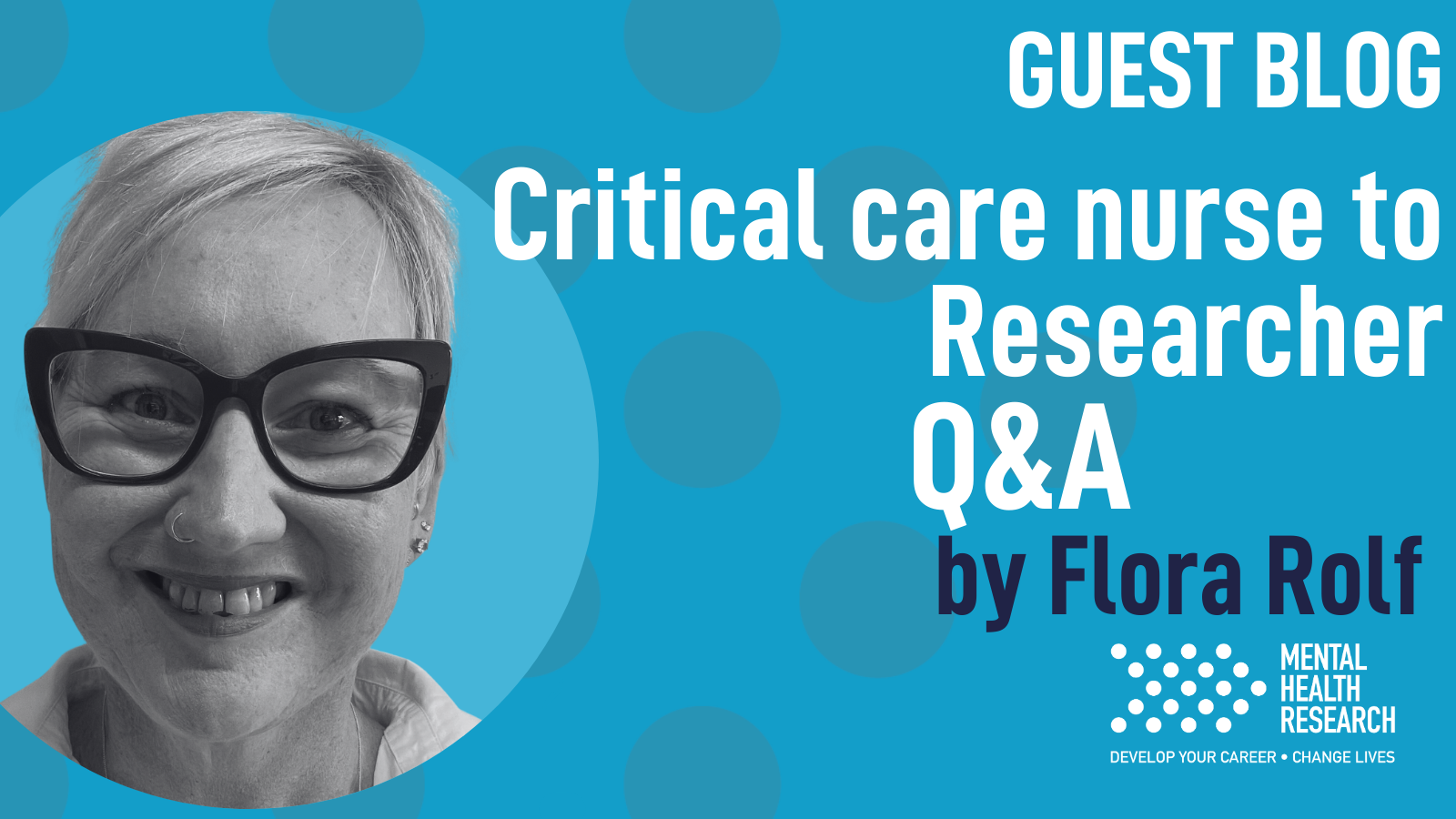
Next in our Q&A series is a member of our current 20203 GROW programme, Floraidh Rolf who transitioned from front line work to mental health research.
“her experiences over time exposed her to the power of research in driving good nursing practice and really making a difference to her patients’ lives”
Flora researches mental health care and support for those in hospital in a critical care unit and uses her past experience as a nurse on those units to inform her approach. She describes herself as a nurses’ nurse. Fiercely hands on, Flora worked in clinical nursing from the early 90s, starting in Australia, through to India, and then the UK. Very driven by bedside work, she never dreamed of writing another essay, let alone becoming a researcher. However, her experiences over time exposed her to the power of research in driving good nursing practice and really making a difference to her patients’ lives. Initially intimidated but then dead curious, she left her beloved frontline for a new home; contributing to nursing through words and discovery.
Flora is an Assistant Professor in nursing, midwifery and health at Northumbria University, check out her institute profile here: Dr Floraidh Rolf (northumbria.ac.uk)
On with the Questions!
-
How did you get started in research/ What inspired you?
I started in research because I had an itch to scratch. I had recognised a gap in practice that seemed unjust, and I wanted to do ‘something’. Working as an adult nurse in critical care, but also being a mental health nurse, I noticed that critical care nurses struggled with confidence and knowledge in caring for people in acute mental distress. I also noticed some assumptions and stereotypes about people living with mental illness that weren’t right. I felt the psychological care could be more therapeutic than it was. As my career moved into academia, I found myself in the right environment to really explore my passion, and I started a PhD. My biggest inspiration was the opportunity to make a difference – to be able to demonstrate to my nursing peers that we could improve our care and think about things in new ways. That felt really exciting to me.
-
What do you enjoy about research?
I really love the work of inquiry. I like looking a complex set of circumstances, and trying to understand the relationships between all of those circumstances. I also really like the discipline of working with a theoretical framework to make sense of what you are seeing and hearing in a way that is intellectually rigorous. It’s challenging but it is really invigorating. I’m a qualitative researcher, and I really love the human dimension to what I do. I look at the person behind the statistics, the complexity of human relationships and the way our social world influences the way we think and behave.
“The research department at your organisation are an absolute goldmine of knowledge and support, make friends with them early!”
-
What training and support have you found most valuable in your career?
I have found practical advice and encouragement to be really valuable. As a researcher, you are often working in unknown horizons – it’s new knowledge. This can be really daunting and given the amount of intense thinking you do, you can very easily start to doubt yourself. Having a peer-cheer squad who are in similar situations really helps you feel okay about the unknown nature of your work. Research is also full of administration and bureaucracy, and practical advice on how to navigate everything from ethics applications, funding bids, data collection, publication and dissemination is critical. It’s a minefield -so finding someone, or some people early on who can help you, makes a big difference.
-
What people/ organisations did you get in touch with to help you?
I worked with people on the ‘frontline’ so I was sure about what I was trying to do. For me, that involved patient and family groups, clinical staff and research staff at my university. The research department at your organisation are an absolute goldmine of knowledge and support, make friends with them early! Their role is to support you, and everyone wants you to do really well – so use the supports available to you. There is a myriad of support organisations really willing to answer questions and provide guidance – bookmark them on your laptop and don’t be afraid to contact them.
-
What are your top 3 tips for somebody starting out in research?
- Persistence is everything: you will have setbacks, you will get bored and you will doubt your research. Turn up regardless, manage the problems as they arise with patience and just keep going – even if the direction changes. Research is very often non-linear, and momentum is important. Like exercise – don’t wait for motivation. Open that laptop and the motivation comes later. The rewards for perseverance are tremendous – successful research really does feel like winning a marathon!
- Have a network. It can be lonely work, but the experiences of exploring new frontiers of knowledge is a shared one. You need peers who can hold you to account, pick you up, celebrate the wins and offer thoughtful and honest feedback about some aspects of your work. You can do the same for them.
- Get your head around feedback. It will come in many forms, and even the painful feedback is valuable to your learning and your work. Work through the emotive experience first, then wait a day or so before addressing negative feedback. As your research progresses, you will become very adept at recognising quality, high value feedback, and that which is less value to you. I think the only way to become discerning is time and exposure. Save all of your positive feedback to read when you are feeling demotivated.
Have you transitioned to mental health research from nursing or a clinical position? What were your experiences?
